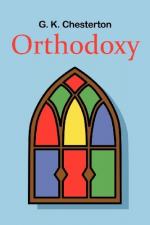
|
| Name: _________________________ | Period: ___________________ |
This test consists of 15 multiple choice questions and 5 short answer questions.
Multiple Choice Questions
1. What, in Chesterton's example, might God have an eternal appetite for?
(a) Theatrics.
(b) Repetition.
(c) Fairytales.
(d) Infancy.
2. Why does Chesterton not claim this new-found philosophy as his own?
(a) It belongs to God and humanity.
(b) It is a way of living rather than a philosophy.
(c) He did not really find or invent it.
(d) He is too modest to claim his own work.
3. When materialism leads a man to fatalism, what does it also accomplish, according to Chesterton?
(a) It cripples his free will.
(b) It also destroys his humanity.
(c) It acts as a liberating force.
(d) It also destroys his sense of hope.
4. What is Chesterton's attitude toward fairy tales?
(a) He thinks fairy tales are useful only in the nursery.
(b) He thinks fairy tales are interesting but not useful in reality.
(c) He thinks fairy tales are harmful to a child's mind.
(d) He is surer of fairy tales than of anything else in the world.
5. What document does Chesterton refer to by the word "orthodoxy"?
(a) The Disciples' Creed.
(b) The Nicene Creed.
(c) The Athanasian Creed.
(d) The Apostles' Creed.
6. As the determinist is confronted with the problem of sin, what does Chesterton say that he believes in?
(a) Changing the environment.
(b) Enforcing the power of free will.
(c) Enforcing the necessity of certain acts.
(d) Asserting that the world is a closed system.
7. According to Chesterton, what characteristics do madmen share with many respected teachers and scientists?
(a) Narcissism and short-sightedness.
(b) Spiritual confusion and materialistic thinking.
(c) Small reason and enlarged common sense.
(d) Enlarged reason and small common sense.
8. How does Chesterton end Chapter One?
(a) Claiming to prove every premise to his thesis.
(b) Exhorting the reader to examine his definition of "orthodoxy."
(c) Beginning to lay the foundation of Christian-Judeo history.
(d) Saying that he will write another book if challenged.
9. What does Chesterton say concerning the boundaries of the will?
(a) The will defines a man's actions fully.
(b) The will is limiting to the man.
(c) The will has boundaries only if it is not a free action.
(d) The will frees a man.
10. What do art and ecstasy recall to us, in Chesterton's words? (Chesterton 2000, p.g 212)
(a) "All the fire of the fairy tales is derived from this."
(b) "For one awful instant we remember that we forget."
(c) "There is no connection, except that one has seen them together."
(d) "For certain dead levels of our life we forget that we have forgotten."
11. What words does Chesterton prefer when referring to nature?
(a) Law, necessity, order.
(b) Law, theory, science.
(c) Necessity, order, tendency.
(d) Charm, spell, enchantment.
12. Chesterton boils democracy down to one ideal. What is this?
(a) The most important things must be done by individuals.
(b) Only a man can rule himself.
(c) Man's ability to rule himself extends only to the limit that he does not violate cultural mores.
(d) Individual beliefs take precedence over societal concerns.
13. What is the problem with taking change as the ideal in a man's life, according to Chesterton?
(a) The notion itself must be able to change, in order to suit the age.
(b) A man prefers monotony.
(c) Change cannot progress.
(d) Change, in itself, is narrow and tedious.
14. How does Chesterton describe a madman's reasoning?
(a) As a precise box.
(b) As a small, perfect circle.
(c) As an infinite line.
(d) As a tangle of threads.
15. What does Chesterton think is the only cure for madness?
(a) Shock therapy.
(b) Being isolated.
(c) Not feeling.
(d) Not thinking.
Short Answer Questions
1. Using the standards of the moralists, why does Chesterton say that the universe cannot be called large?
2. Why does Chesterton say that someone might be entertained by reading the book Orthodoxy?
3. How does Chesterton feel about the book Orthodoxy once it is completed?
4. What does Chesterton not mean by the word "orthodoxy"?
5. According to Chesterton, what effect does the moralists' attitude have on the cosmos?
|
This section contains 752 words (approx. 3 pages at 300 words per page) |

|




